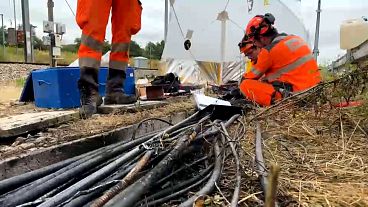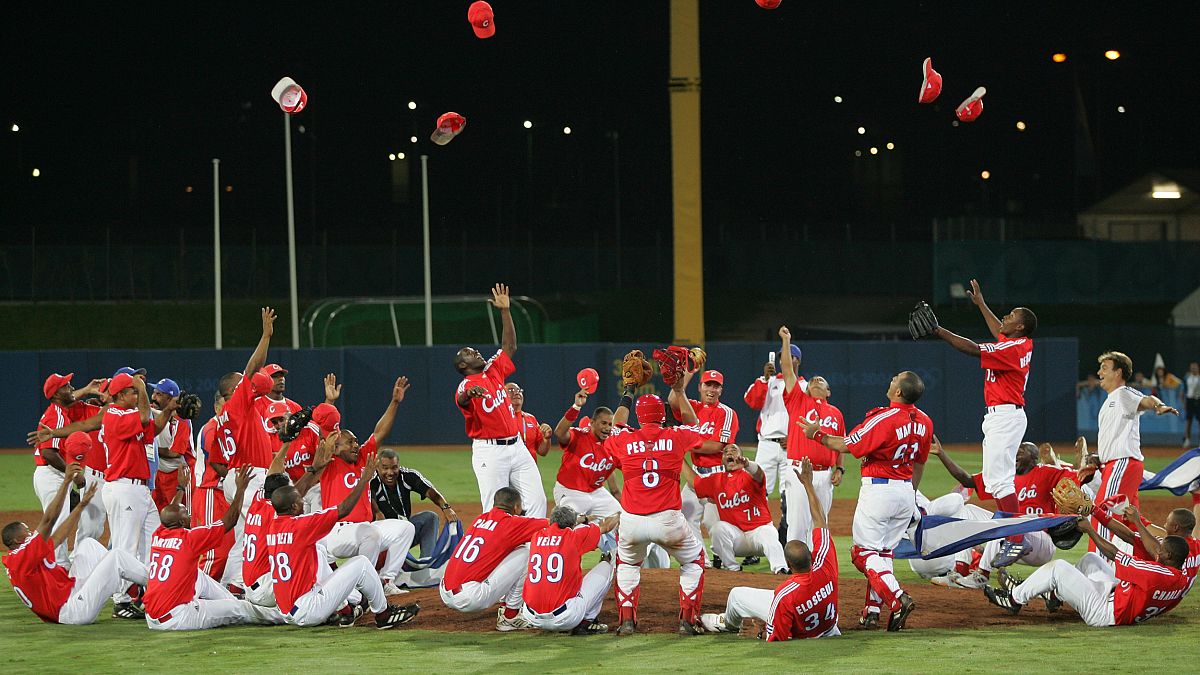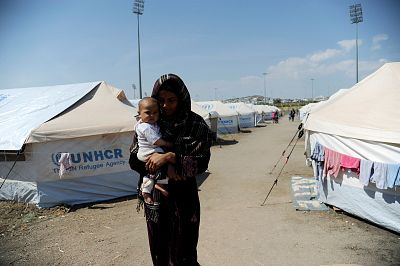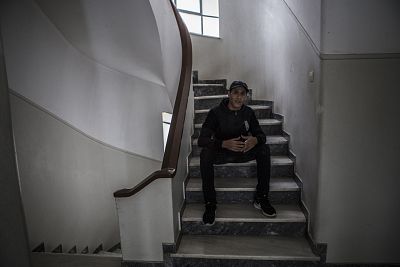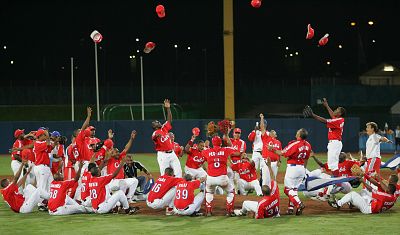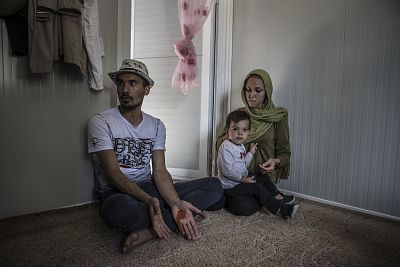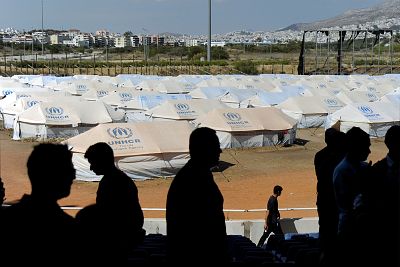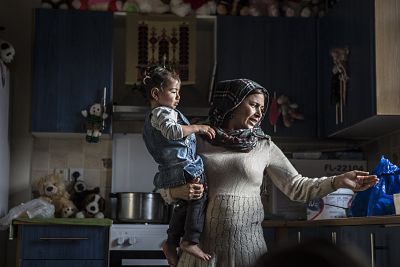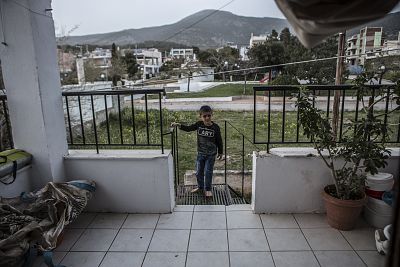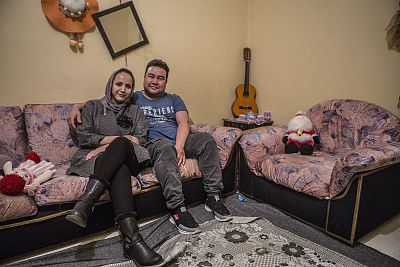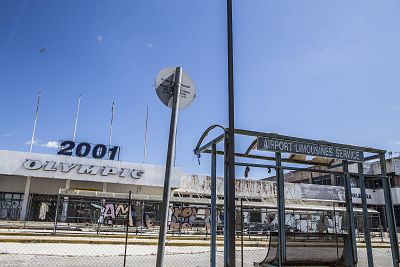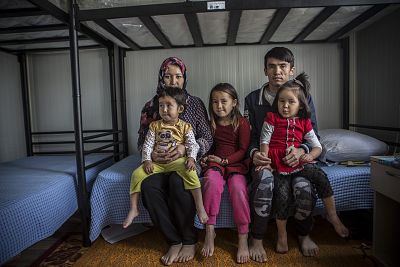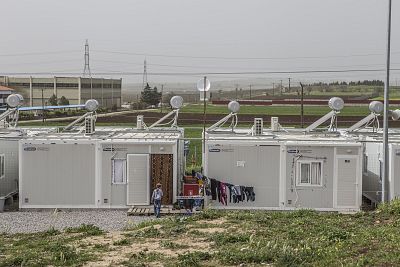Many migrants who reached Greece in the hope it would be an entry to the rest of Europe are now being forced to accept that their journey may end there.
ATHENS, Greece — They dreamed of better lives in the West — and their journeys ended in an unlikely spot: a makeshift tent city built on a baseball field where Olympians once roamed.
When the asylum-seekers and refugees came to Greece in their thousands in 2015, the Athens Summer Games were a distant memory. Some 11 years after the country hosted the games at an estimated cost of $11 billion, many of the venues had been abandoned. Many still remain derelict.
But as Greece struggled to cope with the numbers of people arriving on its shores and crossing its border with Turkey, it built a camp for migrants inside the former Olympic baseball stadium.
The asylum-seekers lived on the field where Yuli Gurriel, now with the Houston Astros, and Nick Markakis, who later won two Gold Gloves and is now an outfielder with the Atlanta Braves, competed for Olympic medals in 2004.
Before being shut down last year, the camp was home to as many as 5,000 people.
The Olympic complex turned refugee camp in the Athens suburb of Elliniko was by no means a pleasant place, and, in one way or another, most of its former residents remain in limbo. Here are some of their stories:
Rock bottom
"Living in Elliniko was not like living," said Samiullah Barez, 27, who fled the Afghan city of Mazar-i-Sharif in late 2015. Barez says he had been threatened by the Taliban.
"I wanted to work for the government and I was drinking alcohol at a few parties," the former law student said, explaining how his run-ins with the Taliban started. His best friend being killed in a bombing was the last straw. He left the country.
But on arriving in Greece he was shocked by the conditions asylum-seekers were forced to live in.
In Elliniko, the former law student had to share a tent with seven other single men, a fact he chose not to share with his parents. "In Afghanistan we have lots of poor people but they didn't live in tents," he said.
Even as a strapping young man, Barez felt unsafe. "There were crazy people, mad people. Some were praying, some were dancing, some were pregnant, some were drinking. It was a very dangerous and strange life."
Knife crime was prevalent, and on one occasion, he said, there were eight fights in one night.
But worst of all, Barez said he struggled with boredom.
He formed a volleyball team to help cope. "We were 10 guys, we would exercise together and organize matches in the camp. It was my love," he said.
When Elliniko closed in June 2017, Barez was taken to an official camp north of Athens. Here he started learning Greek, and eventually the U.N. helped him find a home.
He works as a tailor, a skill he learnt in Afghanistan, while teaching the craft on the side. At 3.52 euros ($4.33) an hour, his pay is below the Greek national living wage.
Barez now lives with five other single men in a three-bedroom apartment in Athens. The building is charming, with a sweeping marble staircase and rickety old elevator. The apartment itself has simple rooms with high ceilings, while in the foyer there is a yellow parakeet in a matching cage.
Barez says he is happy. "Now I have a good life here," he said. "I have many friends."
While he even had a Greek girlfriend last year, Barez says he still does not feel entirely integrated.
"Greek people don't trust people very easily," he said. "I still belong to the refugees. … I want to have friends that trust me."
Born in a tent
Fatima Mohammadi, 22, has only bad memories from her time living in the Elliniko camp.
An Afghan native, she went into labor while living in a tent that had been pitched on the field in the baseball stadium.
When her daughter was born, the doctors said she was too unwell to leave the hospital. The newborn was kept under observation for almost a month.
She and her husband, Feruz, 23, believe the complications were caused in part by the living conditions at the former Olympic complex, which had previously served as an airport.
"My wife was heavily pregnant, and we had to live in a tent and the only showers were cold," said Feruz Mohammadi, recalling life inside Elliniko. "It was a disaster."
Feruz said he worried about protecting his family. "Every night there were fights," he said, "a lot of fights."
Like many of the people who ended up in Elliniko camp, Feruz and Fatima had hoped to reach northern Europe.
Feruz and Fatima will have to stay in Greece, where they have been granted asylum for three years. "If we had money we would have already paid a smuggler, but it costs 10,000 euros ($12,370) for me, my wife and child," explained Feruz.
Unable to move forward and unwilling to return home, Feruz and Fatima have little choice but to try to establish a life here.
A former rice farmer, Feruz is currently learning Greek and English to try to find a job, but he knows they are few and far between. "It is difficult to live here, there is no economy, even Greek people find it hard," he said.
Feruz says he feels frustrated: "I didn't decide to stay in Greece. I wanted to move on."
'Like an animal life'
The Tajik family live in a pretty apartment up a wrought-iron staircase, far out in Athens' suburbs. It is almost the countryside with views of rolling hills from their apartment windows.
Ali Tajik, 13, complains that their home is too far from the city center and he has no friends living nearby. But he says he's not too worried because he knows his problems are temporary.
"I want to go to Germany to see my brother," said Ali, in fluent English. "He's alone there."
Abdul Ghafor Tajik and his wife, Golroz, explain that they paid smugglers to take their 15-year-old son, Ebrahim, ahead to Germany. That increased the chances of them being able to join him there through a family reunification program.
Ebrahim left through Patras port, hiding in a truck that boarded a boat on its way to Italy. "For one week his phone was off," Golroz said. "We didn't eat anything, we didn't sleep. We were so worried."
Finally he got in contact. "I miss you so much," Golroz recounts him telling her.
The family's gamble paid off, and their application has been accepted. The Tajiks are already learning German, and though they say they will miss Greece they are excited to leave.
"We are not going there just for the money, " Abdul Ghafor said. "We are going to change our lives."
As for Elliniko, the Tajik family look back at their time there with dread.
"Our life in Elliniko was like an animal life," said Abdul Ghafor, who has three other children in Greece. "It was so dirty and there was trash everywhere."
Golroz was also pregnant with her youngest, Armita, while living in the camp. The mother of four said she lived in fear there.
"I was too afraid to go to the bathroom alone or to change the baby," she said.
From no English to teaching it
Foroozan Amiri spoke no English when she arrived on the Greek island of Lesbos with her husband in February 2015.
Some three years later, the Afghan refugee now works as an English-Farsi interpreter for the Catholic relief organization Caritas.
Amiri, 26, said teaching English in the Elliniko camp helped her bear the horrendous conditions.
"When I arrived at Elliniko, people said the borders would open in seven days, I thought, 'Oh my God, we have to live here for one week?' We ended up staying for a year," she explained.
By all accounts the facilities in the makeshift camp were not suitable to house thousands of people. Elliniko was divided into three sites: the former airport arrivals hall, the old baseball stadium and a field-hockey stadium. A basketball stadium served as a storage facility.
There were not enough toilets or washing facilities, people slept in tents or under blankets, and security was lacking.
"For two or three months I was so depressed, I just sat inside our tent, but then I decided to change something," said Amiri, who lived in the onetime airport building.
Downloading a dictionary on her phone, she began teaching English, starting with the alphabet. "I learnt as I taught," she said. "I felt useful and I began to come out of my depression."
Today, Amiri is one of the few successful stories of integration in Greece.
Although her job is not a permanent position, she has a greater level of financial security than most refugees and even finds the time to volunteer as a translator for another charity.
Amiri's husband, Rohullah, 30, also has a job distributing food in camps for ARSIS, a Greek charity.
Having fled Iran, where as Afghans they said they were afforded few rights, the couple now live in a pleasant apartment in a middle-class Athens suburb. Their rent is paid for by another Greek organization.
"When you find a job, you can support your life and everything changes," Amiri said, explaining that she is now learning Greek.
The pair have been granted asylum in the country for three years. While life is not perfect, Amiri says she does not regret coming to Greece and will not try to move on to another country unless she has to.
"As long as I can find a long-term job I want to stay here," she said.
Marooned
Many of the asylum-seekers and refugees who ended up in Elliniko reached Greece at a turning point in the country's migration crisis.
By mid-2016 the Balkan countries to the north of Greece had closed their borders, blocking the migrant route to Western Europe and trapping asylum-seekers in the country. In a matter of days Greece was transformed from a transit state into a host nation.
Today, the U.N. estimates that some 50,000 asylum-seekers and refugees remain in Greece, most of them marooned here against their will. The government now faces the task of integrating this new population.
"It is a pressing issue," said Boris Cheshirkov, a spokesman for the U.N. refugee agency in Greece.
The Greek government provides access to education for younger refugees and professional training schemes to help adults find jobs. Greek language classes are also provided to newcomers.
As for Elliniko, the complex will soon have another life. A Greek developer has agreed to buy the prime beachfront real estate property in a 915-million euro ($1 billion) deal to turn it into a seaside town of hotels, residences and shops.
Nostalgia
Not everyone who lived in Elliniko is happier now than they were 12 months ago. Fazl Ahmad Rezaei says he misses life in the baseball stadium.
"The only problem were our belongings inside the tents, as we worried someone would take them. Otherwise life was better there," said the father of three, who now lives in an official camp outside the ancient city of Thebes.
"There is nothing to do here. Life is worse here for psychological reasons," said Rezaei, 30, who fled violence in his native Afghanistan. "My head hurts because I think too much about my problems."
When Elliniko closed last June, many of the 800 people still living there were transferred to Thebes camp.
On the site of an old cotton factory, the camp is clean and residents live in temporary housing.
Its location, however, is far from ideal. Situated near an big industrial site and agricultural fields, the camp is exposed to winds and there is nothing to do in the surrounding area. Next door to the camp is a convenience store, but otherwise Thebes city center is over an hour's walk.
When NBC News visited the camp, children played with sticks and plastic sacks as they counted in Greek.
Rezaei says he misses Elliniko's proximity to Athens and to the beach. "My daughter says to me, 'Let's go to the sea' … but we can't,'" he said.
He also misses his friends. Elliniko, he explains, was full of Afghans, while in Thebes his neighbors are Syrians. "We play football together but we cannot speak," he said, sitting at the table in his small temporary home.
On the upside he says his children seem happy and two attend school, where they study Greek. "They don't understand that they are refugees and have come from another country, so they don't get sad," he said.
Rezaei, on the other hand, says he is going crazy. "If it wasn't for my children, I would have left illegally," he said, adding that he would like to go to Germany to find work.
"The weather is better here, the people are better here, but there are no jobs," he said. "We knew about the situation in Greece, but we didn't think we would have to stay here."

